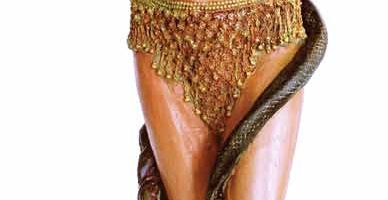
Beyoncé & Moses

“Recording Angel” by Audrey Flack
On the morning of December 13, 2013, I woke up with a smile on my face. I had no idea why. I assumed it had been a good night of sleep, or pleasant dreams, and just wrote it off as the start of a potentially good day. I bounced out of bed and began down the stairs, phone in my hand, like a true millennial.
When I got to the middle landing, I shrieked.
My Twitter, Facebook, email, text messages…they were all inundated with the news.
I sat down and took it in. I checked multiple sources to make sure it was true.
It was.
In the middle of the night, with no advance warning, no leaks, no hints, something incredible had happened.
Beyoncé dropped an album. Fourteen tracks of pure gold, each with an accompanying video.
Naturally, I took a “personal day” to listen, watch, and revel in the artistry. It was glorious. Each song felt like a love letter to Beyoncé’s fans. She wrote to us about being a woman, a wife, a mother, a celebrity, a feminist…a complicated person. She sang words that rang true for me, and words that made me cringe. She made me think, feel, laugh, cry. It was truly a revelatory moment.
I imagined that this was like Moses’ experience at Sinai. (It’s a stretch, but stay with me here.) Moses had this unexpected, thrilling, personal experience with God. Moses went up the mountain not knowing what to expect, and came down having been given words of wisdom, hope, and promise. Like what Beyoncé had given me.
But, then, Moses and I received quite the shock. Because the rest of the world chimed in and ruined everything.
For Moses, the Jews rebelled. They were anxious…and they’d built the Golden Calf to quell their growing fears of the unknown. They bitched, as we often do, because they didn’t understand, because Moses had been away too long, because they were hungry.
For me, the “haters” began to hate. Beyoncé shouldn’t have said the word “bitch” on her album; she shouldn’t have worn such revealing clothing in the videos; she should have focused more on real feminism rather than using it as an artistic technique; and blah blah blah….
I imagine Moses was fed up with the Israelites.
I was fed up too, irritated with my friends far and wide, with media critics, with the world, for ruining my moment with Queen Bey.
Because I had felt this pull, this connection to an artist, that I hadn’t felt in such a long time. Someone out there in the Big Wide World was speaking truth, was sharing a message that lifted me up, and everyone else wanted to tell me why that was just so wrong. Why loving Beyoncé conflicted with my identity as a feminist. Why comparing this listening experience to Moses and Sinai was blasphemous and made me a bad Jew. All of this and more.
And it occurred to me that we spend too much time doing this — yucking other people’s yums, telling them why they shouldn’t like what they like, instead of allowing us just to enjoy.
And we Jews aren’t exempt from this, sadly. We constantly tell one another what it means to be at “good Jew,” how to feel about Israel or halakha [Jewish law], or what it means to “really” keep kosher. Even though we are people of argument, there’s something to be said for allowing every Jew to have her pleasures, even if it doesn’t make sense to you.
My Beyoncé experience reminded me of Moses because my day-to-day activities are what relate me to my Judaism. My daily life is constantly evolving, changing, shifting, based on whom I meet and what I do. And so does my Judaism. And that’s pretty great, because a language, or a culture, or a community that doesn’t evolve tends to die. The more we push the boundaries of what it means to be a woman, an artist, a Jew, the more likely we are to not just survive, but thrive.
Beyoncé’s words gave me comfort, strength, and joy.
Isn’t that what Judaism should give us, too?
[This piece is adapted from a SermonSlam with the theme of “Revelation” that Diamant participated in Boston. She notes, “I am not a rabbi, so I don’t often write sermons. I googled ‘revelation’ and got a lot of Christian inspiration. So I thought long and hard about a time when I had experienced revelation, when I had a personal interaction with the Divine….”]
Emilia Diamant is the Assistant Director at Prozdor of Hebrew College outside Boston.


